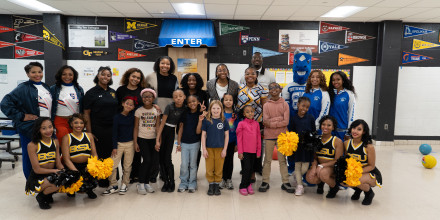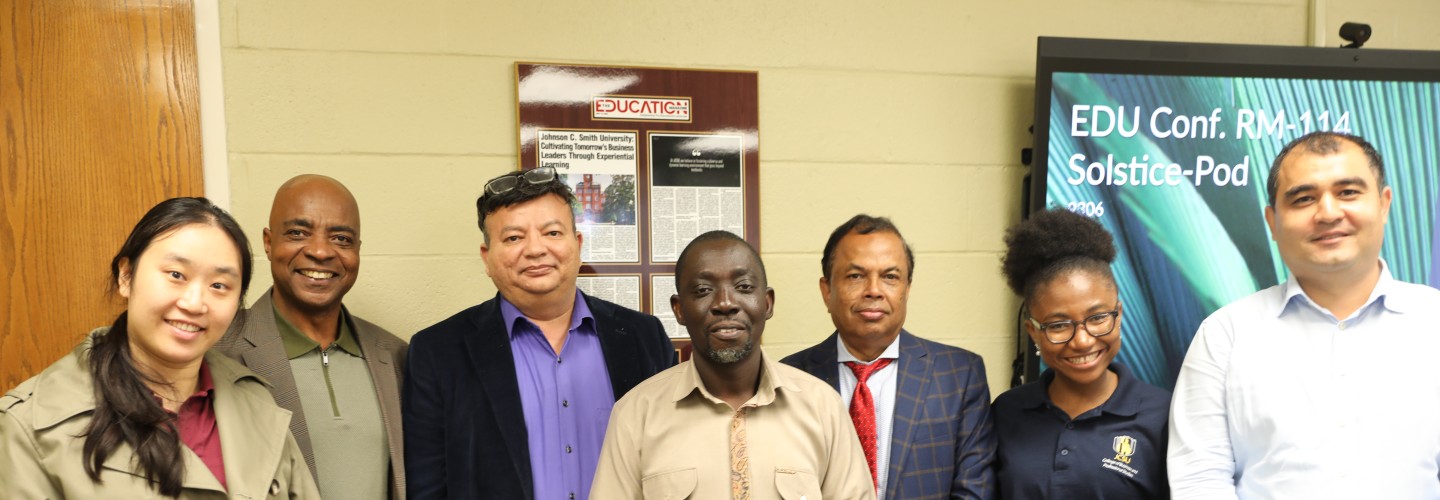
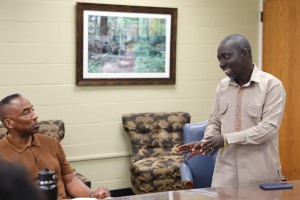
Charlotte, N.C. / October 6, 2025 — Africa has one of the highest rates of international research collaboration, especially with major scientific power houses like the United States. In October, Dr. Alphonso Ogbuehi, Dean of the Johnson C. Smith University College of Business invited Dr. Eugene Okyere-Kwakye, Dean of the School of Business at Koforidua Technical University in Ghana, to the Charlotte-based campus of JCSU. The conversation on campus was an extension of conversations that began in Ghana during a JCSU delegation trip led by President Kinloch July 2025. The conversation that emerged in October at JCSU continues to shed light on international collaborations that may occur in the future.
The conversation between JCSU faculty, students, administrators and Dr. Okyere-Kwakye, spanned topics ranging from cocoa production and entrepreneurship to women’s empowerment and social work as community engagement. Those gathered also discussed the potential for academia to arrive as a media enterprise to increase outreach to non-academic populations.
“Sometimes we teach entrepreneurship on the radio,” Dr. Okyere-Kwakye explained. “Women and artisans listen to lessons on pricing, bookkeeping, and marketing. They even call in to ask questions. One might say, ‘Can you teach us how to write a business plan?’ So, I design a lesson on that the next week.”
Koforidua Technical University, located about 50 miles northeast of Accra serves more than 11,000 students. The institution is part of a national effort to prepare a workforce capable of transforming Ghana’s economy from exporting raw materials to producing high-quality, manufactured goods.
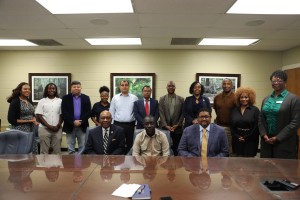
“We have a very large quantity of cocoa,” Dr. Okyere-Kwakye said. “But the problem is how to add value to it. Even today, we still export cocoa in its raw form. That’s why technical university students must learn to refine and process what we produce. Otherwise, we will continue to depend on others.”
Dr. Okyere-Kwakye explained that Ghana’s technical universities were established to produce intellectuals astute at practical problem-solving, people who can apply knowledge gained to real-world development. “For Africa to grow,” he said, “we must be hands-on and productive. We must create what we consume.”
Koforidua Technical University and Johnson C. Smith University can be models for experiential learning for institutions around the world. Dr. Okyere-Kwakye described Ghana’s Competency-Based Training (CBT) model, where students must demonstrate proficiency before graduating.
“If we ask you to mold something and you don’t do it right,” he said, “we don’t fail you. We keep working with you until you can do it correctly. That’s when you finish.”
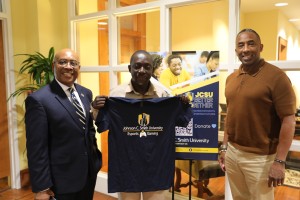
At the Ghana-based campus, faculty members also spend time in local industries to stay current with evolving practices. “You cannot teach hands-on if you have never done it yourself,” he added. In turn, the dean explained, professors often take the curriculum directly into communities to support small-business owners.
“About 70 percent of Ghana’s workforce operates in cottage industries,” he said. “They have skill, but it is not refined. We go to them and train them in accounting, branding, marketing, and safety. When we go to them, the whole community grows.” Under this model, secondary education is not reserved for the talented few. It is an equal opportunity enterprise.
Dr. Okyere-Kwakye said one of the most rewarding aspects of his work is training and empowering women. “We teach women bead making, fruit juice production, soap making, and other trades that help them build their own businesses,” he said. “Women are strong now—very strong. When we train women, we help families, communities, and the entire nation.”
Dr. Okyere-Kwakye also spoke about the challenge of connecting higher education to Ghana’s entrepreneurial youth. This is pertinent in an era when a cadre of young people forego university education for entrepreneurial endeavors right out of secondary school. “Many young people start businesses at 18 or 19,” he said. “By 21 or 22, they are already successful. They ask, ‘Why do I need university?’ But university is not about money—it’s about refining what you already know, so you can grow."
When Ghana first transitioned to the technical university model, many faculty members struggled to adapt. “We were taught through theory, so suddenly we had to teach hands-on,” Dr. Okyere-Kwakye said. “We had to learn again.”
To address this shift, the university began sending faculty for industry training and recruiting professionals directly from the field. “When we find an engineer with experience, we bring them in to teach,” he explained. “Because if you are too theoretical, you may not survive long in a technical university.” Dr. Okyere-Kwakye spoke candidly about survival in the new terrain. It takes the right leaders at the right time. “You can have all the talent, machinery, and skill, but if leadership is not right, you will not move forward,” he said. “Africa has everything—gold, cocoa, oil—but we still borrow money. That means something is wrong.”
During the discussion, Dr. Maureen Leary, Chair of Business Administration and Dr. Judith Crocker-Billingsley, Associate Professor of Social Work at JCSU expressed interest in the role of community development in growing grass roots business leaders. Dr. Okyere-Kwakye said social work could be the bridge between academic instruction in business and community development. “When we talk about development, we are not only talking about business and technology—we are talking about people and how they live,” he said.
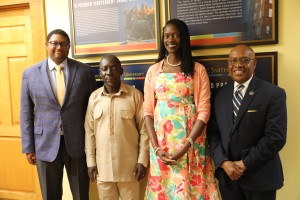
Like JCSU, Koforidua Technical University is at the forefront of Building Global Bridges. The university currently partners with institutions in Germany, China, Holland, Malaysia, Singapore, and Canada. Dr. Okyere-Kwakye said he hopes to rebuild partnerships in the United States through collaboration with JCSU. “Being here now, I believe we can start something new—and something good,” he said.
President Kinloch, along with Dr. Ogbuehi and Dr. Okyere-Kwakye envision faculty exchanges, joint research, and virtual workshops between the two universities. Dr. Okyere-Kwakye says, “We can collaborate not only in person but also through online platforms. We can apply for international grants together—projects that strengthen African universities and expand global learning,” Dr. Okyere-Kwakye said. It is a lesson in global reciprocity. “We learn from each other, we share ideas, and we create something that lasts.”


